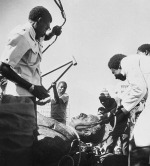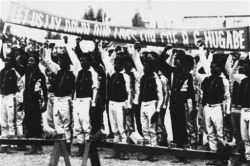Zimbabwe: Colonization

Melissa Murrin
Hjelmgren 123
Period 1 5.8.09
In the 16th century, the Portuguese, followed by the British, were the first Europeans to attempt colonization of south-central Africa, but the hinterland lay virtually untouched by Europeans until the arrival of explorers. In 1888, Cecil Rhodes obtained a concession for mineral rights from local chiefs. Later that year, the area that became Southern and Northern Rhodesia was proclaimed a British sphere of influence. The British South Africa Company was chartered in 1889, and the settlement of Salisbury (now Harare, the capital) was established in 1890. In 1895, the territory was formally named Rhodesia after Cecil Rhodes under the British South Africa Company's administration.
Fifteenth Century Portugal, especially under Henry the Navigator, probed along the West African coast. They were looking to take over villages, steal the resources and enslave the people. Portuguese explorer Prince Henry, known as the Navigator, was the first European to methodically explore Africa and the oceanic route to the Indies. From his residence in the Algarve region of southern Portugal, he directed successive expeditions to circumnavigate Africa and reach India. Along the western and eastern coasts of Africa, progress was also steady; Portuguese sailors reached Cape Bojador in 1434 and Cape Blanco in 1441. Soon after, they built a fortress on the island of Arguin in modern day Mauritania, trading European wheat and cloth for African gold and slaves. Portuguese settlers destroyed the trade and began a series of wars, which left the empire in near collapse in the early 17th century. The native tribes did not have the ability to resist against the armies of the exploring countries. Native tribes had poor leaderships and no weapons to fight against the weapons of the exploring armies.
The armies that came around with the explorers conquered the native people on the island of Arguin, were the explorers took all the natives resources and land and built a fortress. The European’s began trading the native’s wheat and cloth for African gold and slaves that they took prisoner. Most of the slaves were sent to Madeira, which became, after thorough deforestation, the first European plantation colony. Between 1444 and 1447, the Portuguese explored the coasts of Senegal, Gambia, and Guinea. The Portuguese took over all the native trade routes. The main resources that they ended up taking from Zimbabwe were the people they had them working in the mines and the fields and the mineral wealth. They also gained control of all the trade routes leading toward the inner parts of Africa.
They took the people of Zimbabwe as slaves. Forcing them from their families to walk many miles in harsh conditions, with no rest and very little food and water. Some they sent to Europe to become slaves there, other stayed in Africa to become slaves here. In Zimbabwe they used the native people to work in the mines and the fields. They forced them to transport the goods they took back to the coast for shipment for Europe. Fernao Gomes rented the rights of African exploration for five years. Under his direction, the Portuguese reached modern Ghana and settled in the mine. They had finally reached a country with an abundance of gold, hence the historical name of "Gold Coast" which they took for them selves and made the salves carry around for them everywhere.
One of the major tribes, occupying Zimbabwe was the Shona Tribe. Shona people were a clan that used a common set of totems, or rules. People of the same totem are the descendants of one common ancestor (the founder of that totem). Shona people recognize this totem unity even across tribal boundary lines. This identification by totem has very important traditional ceremonies written in it such as the burial ceremony. This would be considered a pagan culture or religion. The conquering explorers converted all of these native peoples to Christianity. Which did away with most of their native traditions. This impact was very great because the European’s came in and took away all of the peoples religion and traditions and replaced them with their own Europeans religions and traditions.
“Background Note: Zimbabwe” U.S. Department of State. April 2009. <http://www.state.gov/r/pa/ei/bgn/5479.htm>
“Zimbabwe Information” Art&Life in Africa. 15 October 1998. <http://www.uiowa.edu/~africart/toc/countries/Zimbabwe.html>
Prestage, Edgar. “The Portuguese Pioneers.” Zimbabwe books. <http://books.google.com/books?id=KLxQRUWUb5IC&pg=PA212&lpg=PA212&dq=African+king+Ogane.&source=bl&ots=K4L70pwTGH&sig=oB35DrB5ZhIrsFMcvevwAV3rx-g&hl=en&ei=3aD_SfjlA5LIMvb9jdcH&sa=X&oi=book_result&ct=result&resnum=6#PPA4,M2>
Last Updated by Melissa Murrin 21 May 2009
Hjelmgren 123
Period 1 5.8.09
In the 16th century, the Portuguese, followed by the British, were the first Europeans to attempt colonization of south-central Africa, but the hinterland lay virtually untouched by Europeans until the arrival of explorers. In 1888, Cecil Rhodes obtained a concession for mineral rights from local chiefs. Later that year, the area that became Southern and Northern Rhodesia was proclaimed a British sphere of influence. The British South Africa Company was chartered in 1889, and the settlement of Salisbury (now Harare, the capital) was established in 1890. In 1895, the territory was formally named Rhodesia after Cecil Rhodes under the British South Africa Company's administration.
Fifteenth Century Portugal, especially under Henry the Navigator, probed along the West African coast. They were looking to take over villages, steal the resources and enslave the people. Portuguese explorer Prince Henry, known as the Navigator, was the first European to methodically explore Africa and the oceanic route to the Indies. From his residence in the Algarve region of southern Portugal, he directed successive expeditions to circumnavigate Africa and reach India. Along the western and eastern coasts of Africa, progress was also steady; Portuguese sailors reached Cape Bojador in 1434 and Cape Blanco in 1441. Soon after, they built a fortress on the island of Arguin in modern day Mauritania, trading European wheat and cloth for African gold and slaves. Portuguese settlers destroyed the trade and began a series of wars, which left the empire in near collapse in the early 17th century. The native tribes did not have the ability to resist against the armies of the exploring countries. Native tribes had poor leaderships and no weapons to fight against the weapons of the exploring armies.
The armies that came around with the explorers conquered the native people on the island of Arguin, were the explorers took all the natives resources and land and built a fortress. The European’s began trading the native’s wheat and cloth for African gold and slaves that they took prisoner. Most of the slaves were sent to Madeira, which became, after thorough deforestation, the first European plantation colony. Between 1444 and 1447, the Portuguese explored the coasts of Senegal, Gambia, and Guinea. The Portuguese took over all the native trade routes. The main resources that they ended up taking from Zimbabwe were the people they had them working in the mines and the fields and the mineral wealth. They also gained control of all the trade routes leading toward the inner parts of Africa.
They took the people of Zimbabwe as slaves. Forcing them from their families to walk many miles in harsh conditions, with no rest and very little food and water. Some they sent to Europe to become slaves there, other stayed in Africa to become slaves here. In Zimbabwe they used the native people to work in the mines and the fields. They forced them to transport the goods they took back to the coast for shipment for Europe. Fernao Gomes rented the rights of African exploration for five years. Under his direction, the Portuguese reached modern Ghana and settled in the mine. They had finally reached a country with an abundance of gold, hence the historical name of "Gold Coast" which they took for them selves and made the salves carry around for them everywhere.
One of the major tribes, occupying Zimbabwe was the Shona Tribe. Shona people were a clan that used a common set of totems, or rules. People of the same totem are the descendants of one common ancestor (the founder of that totem). Shona people recognize this totem unity even across tribal boundary lines. This identification by totem has very important traditional ceremonies written in it such as the burial ceremony. This would be considered a pagan culture or religion. The conquering explorers converted all of these native peoples to Christianity. Which did away with most of their native traditions. This impact was very great because the European’s came in and took away all of the peoples religion and traditions and replaced them with their own Europeans religions and traditions.
“Background Note: Zimbabwe” U.S. Department of State. April 2009. <http://www.state.gov/r/pa/ei/bgn/5479.htm>
“Zimbabwe Information” Art&Life in Africa. 15 October 1998. <http://www.uiowa.edu/~africart/toc/countries/Zimbabwe.html>
Prestage, Edgar. “The Portuguese Pioneers.” Zimbabwe books. <http://books.google.com/books?id=KLxQRUWUb5IC&pg=PA212&lpg=PA212&dq=African+king+Ogane.&source=bl&ots=K4L70pwTGH&sig=oB35DrB5ZhIrsFMcvevwAV3rx-g&hl=en&ei=3aD_SfjlA5LIMvb9jdcH&sa=X&oi=book_result&ct=result&resnum=6#PPA4,M2>
Last Updated by Melissa Murrin 21 May 2009

